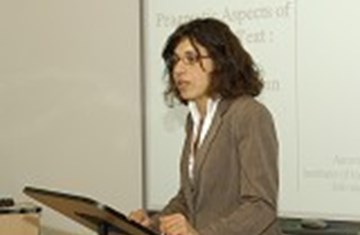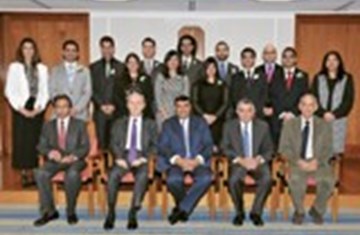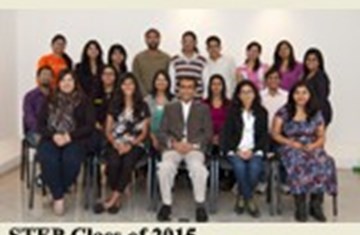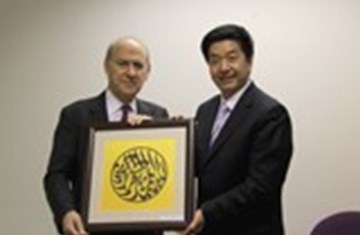In Memoriam: Annemarie Schimmel, 1922-2003
In Professor Schimmel’s passing, the world has lost an eminent scholar and extraordinary human being. She was my mentor during my undergraduate and graduate school days here at Harvard, and the memories now flood my mind of how kind, gentle, and caring she always was towards me and all those who knew her. All through the years, she remained ever-loyal and ever-generous to me and her many friends around the world. It is with sadness and profound gratitude that I reflect on this most gifted and distinguished of scholars and dearest of friends.”
Born in Erfurt, Germany in 1922, she received her first doctorate in Arabic, Persian, Turkish and Islamic Art from University of Berlin in 1941 at the age of 19, followed by a second doctorate in 1951 in the History of Religion from the University of Marburg. From 1946-54, she taught at the University, having been appointed to the Chair of Arabic and Islamic Studies at the age of 23.
After a research visit to Turkey in 1952, she fell in love with the generous hospitality and friendship of the poets and mystics of Istanbul and so gladly accepted the offer in 1954 to become Professor of the History of Religion in the Faculty of Islamic Theology at Ankara University, where she remained, lecturing in Turkish for five years.
Upon returning to Europe, she was appointed Associate Professor of Arabic and Islamic Studies at the University of Bonn (1961-64), before accepting an invitation to teach at Harvard University in 1966. She initially served as Lecturer in Indo-Muslim Culture (1966-70) and later as full Professor of Indo-Muslim Culture (1970-92) for two and a half decades. On the occasion of her retirement in 1992, to celebrate her lifetime of teaching, two volumes of essays, written as tributes to her teaching and work by 50 of her fellow colleagues and students, were printed in 1995 in Germany and the United States.
She made such an impression in Pakistan that a major boulevard was named after her in the city of Lahore. She also received three honorary degrees from Pakistani universities and was awarded the country’s highest civil distinction (Hilal-i Pakistan). In 1980, she was elected President of the International Association of the History of Religion, being the first woman and Islam specialist to hold the position. In 1992, she delivered the prestigious Gifford Lectures at the University of Edinburgh, which were later published in book form as Deciphering the Signs of God: A Phenomenological Approach to Islam (Albany: State University of New York, 1994). The book was described by Professor William Chittick as “a landmark in bringing Islamic Studies into the mainstream of religious studies.”
At least once a year, Professor Schimmel visited London, where she taught summer courses on Islam at The Institute of Ismaili Studies (with which she published Make A Shield From Wisdom: Selected Verses from Nasir-i Khusraw’s Divan) and also delivered lectures at the University of London’s School of Oriental and African Studies, the Furqan Foundation and the Royal Asiatic Society. Large crowds, numbering several hundreds, invariably flocked to these lectures.
In addition to some 500 articles in edited collections and encyclopaedias, Professor Schimmel authored over 150 books and pamphlets. During her retirement years alone (1992-2003), she produced no fewer than 40 works, including her autobiography. She also wrote innumerable prefaces to books by students and colleagues, and penned countless popular articles in newspapers and local journals.
My memory of her is that of a great teacher. Like the verses of Nasir Khusraw that she translated, she:[…] planted in the garden of notes and papers, sweet herbs and hyacinths from prose and verse; bringing fruits and roses from the finest meaning; making lovely trees elegant expression.”
Azim Nanji, former Director, The Institute of Ismaili Studies










